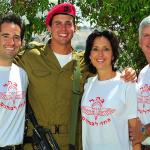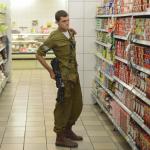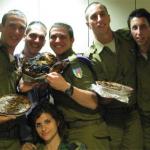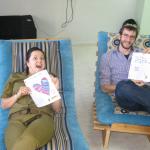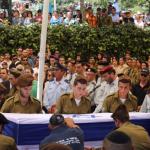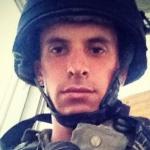Lone, Not Alone:
Since before Israel declared independence in 1948, thousands of Jews from around the world have arrived to serve in the military in times of crisis and in times of peace. Lone soldiers, as they are called, receive additional benefits from the IDF and the government, and they enjoy a special place in society. This lesson examines the motivations that drive people to choose this path, and the price they pay for volunteering. The connection between lone soldiers and the broader notion of Jewish peoplehood is explored as well.

Program Description
Each unit in this lesson includes information, sources for more study, and one or more profiles of real people. For each of them, there are many more examples that you can draw from, whether people in your own community or others whose story has been captured online.
To begin this study, you may want to talk with your learners about the things they care deeply about.
- How would they rate those things, in terms of importance?
- Where do country, community, friends, family, and beliefs fit in?
- For each of them, what would they sacrifice in order to protect or strengthen these things?
Keep in mind that significant things come in all shapes and sizes. Some people may care about basketball so much that they are willing to give up every Sunday to practice, while others may care about the environment enough to use a bicycle as their only form of transportation.
Max Steinberg: An American Who Fell in Love With Israel
The story of Max Steinberg can be used as a bridge to link this conversation to the study of lone soldiers.
Steinberg grew up in Southern California. In 2012, he visited Israel for the first time on a Taglit-Birthright Israel trip. Along with his brother and sister, he toured the country and fell in love with the land. According to family members, the pivotal moment in the trip came when he visited the military cemetery at Mt. Herzl in Jerusalem. Standing at the grave of Michael Levin, a young American Jew who moved to Israel, enlisted in the IDF, and was killed during the 2006 Second Lebanon War, something clicked for Steinberg. Like Levin, he too enlisted in the IDF, serving in the elite Golani brigade.
Sadly, Steinberg’s fate was not so different from Levin’s. On July 20, 2014, the Golani sharpshooter was killed, along with 12 other IDF soldiers, during a day of fierce fighting in Gaza.
He was 24 years old.
Steinberg’s death, along with that of another lone soldier from the U.S., Sean Carmeli, galvanized the Israeli public. Some 30,000 people paid their respects by attending his funeral on Mt. Herzl. His parents, who flew in from California for the funeral, were overwhelmed when they saw the throngs of people. It was their first visit to Israel, and they expressed appreciation for the outpouring of love and respect the Israeli public showed for Max.
Questions to consider:
- Is there any part of this story that they can identify with?
- What words would they use to describe their opinions about him and the choices he made?
- Looking back on their list of important things and values, if they could travel halfway around the world to protect one of them, would they do it?
- Have they ever considered joining the U.S. army? What about the Israeli army?
While we all have issues for which we’d sacrifice a great deal, few of us imagine the possibility of taking 18 months – 3 years out of our lives to volunteer for the army. Whether it’s out of a sense of duty or responsibility, their stories and decisions are interesting to consider.
When Prime Minister Yitzhak Rabin dedicated a memorial to the volunteers from overseas who came to fight for Israel’s founding, he said:
You came to us when we needed you most, during those difficult, uncertain days in our War of Independence. You gave us not only your experience, but your lives as well. The people of Israel and the State of Israel will never forget, and will always cherish, this unique contribution made by you – the volunteers of Machal.
Many of the volunteers who hailed from 59 different countries came with experience from fighting for the allied forces in World War II. While the Machal volunteers represented a small portion of the overall fighting force, within the air force (which was born out of the needs of the War of Independence), they represented 90% of the aircrew. Because most of the Air Force crew – along with the commanders – came from the US, Canada, South Africa and Britain, the language of operation for the entire Air Force was English.
For more information about the impact of the Machal unit on the War of Independence, check out this website dedicated to the story of Machal.
Toldot Yisrael, an organization committed to recording the stories of 1948 Israel, has made a 15-minute video celebrating the volunteers who helped with the establishment of the State of Israel.
The videos, which are mostly in English with some translations of interviews, provide a treasure trove of information, archival footage, and stories of those remarkable people who felt like they couldn’t stay at home when Israel needed them.
You can find background on the events and people in this video here.
Questions to consider with your learners about the people and events in the film:
- Would they have volunteered for this cause?
- Defeating anti-Semitism is a major reason that the volunteers were motivated to engage in this cause. Do they still feel that anti-Semitism is a cause for concern? Why or why not?
- What was the most interesting aspect of this film?
- What didn’t they like about this film?
Harold Katz: From Harvard Law School to a British Internment Camp
Of the stories in the video, one of the most relatable is that of Harold Katz, a student at Harvard Law School, who’d recently returned from serving with the US Navy in World War II. Should you decide not to screen the entire 15-minute video, Katz’s story is powerful on its own.
Like many American Jews, he followed news of the efforts to establish a Jewish state, and he was moved by stories of Holocaust survivors who wanted to settle in pre-State Israel but were not allowed to enter the land. While many American Jews were concerned by this situation, Katz felt compelled to do something about it. He dropped out of Harvard and volunteered to help smuggle survivors through the British blockade by boat. “We couldn’t just sit in law school while history was being made,” he said, “We had to do something.”
Questions to consider:
- What do you think about his decision to leave law school in order to help fight?
- How does it change your opinion of his decision knowing that he’d served in the US Navy?
- In 1947, the fate of the Jewish state was far from assured. With a large population of Holocaust survivors and enemy countries on either side, it was entirely possible the Jewish dream for a state would be over just as fast as it began. How does this change your feeling on Harold Katz’s decision to serve?
- While Max Steinberg and Harold Katz served as volunteers during very different moments in Israel’s history, what commonalities do you see in their two stories?
While the years surrounding Israel’s independence were fraught with existential crisis, the desire to volunteer for the army did not stop when there wasn’t a war being fought.
Some facts about lone soldiers:
- Each year, there are approximately 2800 immigrant lone soldiers serving, with 950 more arriving and leaving every year.
- Recently, about 40% of lone soldiers joined combat units.
- Some non-immigrants also have the designation of lone soldier, including orphans and people whose parents in Israel are no longer willing to support them.
To learn about the benefits that lone soldiers are entitled to, The Nefesh B’Nefesh website provides a great deal of information.
There are many ways for your students to learn more about lone soldier. The following news pieces can be assigned or examined in your learning environment:
- This article from the New York Times highlights the roles and motivations of lone soldiers.
- Joel Chasnoff is an American Jewish comedian who served in the IDF after graduating from college. Hear an interview with him on WBEZ radio station here and watch a short video in which he talks about his book, The 188th Crybaby Brigade.
- Lone Soldiers are Far From Alone, The Jewish Week, July 30, 2014.
Questions to consider:
- What impact do lone soldiers have on their friends, family, and the soldiers they serve with?
- What questions do you have for people who’ve made this decision?
What Benefit Do Lone Soldiers Provide for Israel?
Lone soldiers aren’t the only ones who make sacrifices to serve in the IDF. The cost of the additional benefits (stipends, housing, trips home, days off) are covered by the Israeli government and the army.
Some may question this investment on the part of the Israeli government and army. What benefit do these soldiers provide for the Israeli military? What benefit do these soldiers bring to their fellow soldiers, to Israeli society at large, and to their diaspora communities?
While there isn’t clear information on the cost and the effect of these soldiers, there is anecdotal evidence in many of the sites listed above about the impact of lone soldiers on their peers in Israel and their communities.
You may want to divide your students into groups to take up various positions on this issue and convene a debate or a mock meeting of interested parties. Some of your students may represent Israeli-born soldiers, while others can represent the government, the IDF, the lone soldier, and the soldier’s diaspora community. Allow time for groups to research the issue and come to a decision on the following issues:
- Should there be a limit on the number of soldiers from outside Israel that the country should accept?
- Would you distinguish between lone soldiers who join while making aliya and soldiers who volunteer as part of Machal?
- What happens if a soldier wants to return home in the middle of his or her service?
- Should these soldiers fight in combat units during wartime?
- If a lone soldier is killed in action, should his/her family have the option of burial in an Israeli military cemetery? Would you distinguish between volunteers and new citizens?
Your students may want to reflect on the funerals of three American lone soldiers: Michael Levin, Max Steinberg, and Sean Carmeli. When these three young men were killed in action, their families were concerned that few people would attend; some even worried there would not be a minyan. When they arrived, all of them were greeted by thousands of people, most of whom had not known their sons, at the funeral. What does it say about Israel’s feelings towards lone soldiers? What does it say about the people of Israel? The images and articles posted after those funerals are a remarkable testament to the impact of these volunteer soldiers.
The State of Israel is there for me as my Jewish homeland. The least I could do was to be there for it: I wanted to contribute the bit that I could for its safety, existence, and success – to put my sweat into something that is vital to us as a people.
– Benji Shiller grew up in Cleveland, Ohio, and served in the IDF’s Givati Brigade.
I knew I wanted to live in Israel, and felt strongly that I wanted to fulfill the same obligations of citizenship that native-born Israelis fulfill. I did not think that I should be exempt from the civic duty of service just because I was born outside of Israel; older than 18, or a woman. I saw IDF service as a way to serve my country; integrate socially, and fulfill my civic obligations.
– Flo Low grew up in St. Louis, Missouri, and served in the IDF as a basic training commander.
The following are good ways to learn their stories:
- The Write On For Israel/San Francisco teen participants created the following video about lone soldiers: https://www.youtube.com/watch?v=NyrbA7JB6Uk#t=192. The video features the stories of different types of lone soldiers, highlighting their various goals and motivations.
- The Israel Forever Foundation has some excellent videos that give an inside peak into life as a lone soldier, which can be found here: http://israelforever.org/programs/thelonesoldierproject/.
- Michael Levin grew up in suburban Philadelphia, Pennsylvania, and served in the IDF Paratroopers brigade. He was killed in action on August 1, 2006, fighting in the Second Lebanon War. His story has been made into a movie, and his grave in the Mt. Herzl Military Cemetery in Jerusalem is the most-visited grave there.
- You can learn more in these two videos:
- The Lone Soldier Center was created to assist lone soldiers in Israel in memory of Michael Levin. Their website (https://lonesoldiercenter.com/) includes more information about Michael, in addition to information about Lone Soldiers.
- Many lone soldiers keep blogs in order to communicate their experiences with friends and family. They’re an excellent inside look into life as a lone soldier. One lone soldier is Hannah from Boca Ratonm, who began her basic training in late April 2015. Her story can be read here: http://hannahintheidf.blogspot.com/.
- If any members of your community serve or have served as lone soldiers in Israel, consider sharing their stories – or inviting them to speak to your students – to give their personal perspective on the phenomenon. Encourage guest speakers to bring photographs from their army service, as well as any mementos that will help students imagine what the experience entailed.
